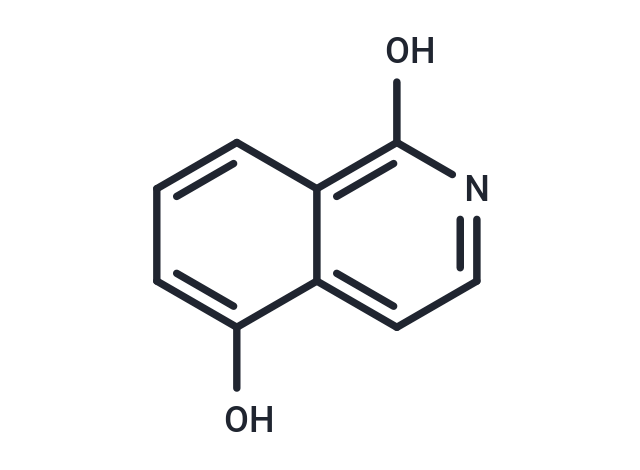Shopping Cart
- Remove All
 Your shopping cart is currently empty
Your shopping cart is currently empty

1, 5-Isoquinolinediol is an inhibitor of poly(ADP-ribose) synthetase (PARP1; IC50: 0.39 μM). The poly(ADP-ribose) polymerases (PARPs) form a family of enzymes with roles in DNA repair and apoptosis. 1, 5-Isoquinolinediol has been used to study the role of PARP1 in both DNA repair and oxidant stress-induced cell death. This compound can be used with cells in culture and in animals.

| Pack Size | Price | Availability | Quantity |
|---|---|---|---|
| 25 mg | $38 | In Stock | |
| 50 mg | $64 | In Stock | |
| 100 mg | $101 | In Stock | |
| 200 mg | $148 | In Stock | |
| 1 mL x 10 mM (in DMSO) | $29 | In Stock |
| Description | 1, 5-Isoquinolinediol is an inhibitor of poly(ADP-ribose) synthetase (PARP1; IC50: 0.39 μM). The poly(ADP-ribose) polymerases (PARPs) form a family of enzymes with roles in DNA repair and apoptosis. 1, 5-Isoquinolinediol has been used to study the role of |
| Targets&IC50 | PARP1:0.39 μM |
| Molecular Weight | 161.16 |
| Formula | C9H7NO2 |
| Cas No. | 5154-02-9 |
| Smiles | Oc1cccc2c(O)nccc12 |
| Relative Density. | 1.2480 g/cm3 (Estimated) |
| Storage | Powder: -20°C for 3 years | In solvent: -80°C for 1 year | Shipping with blue ice. | |||||||||||||||||||||||||||||||||||
| Solubility Information | H2O: 1 mg/mL Ethanol: 20 mg/mL DMSO: 55 mg/mL (341.28 mM) | |||||||||||||||||||||||||||||||||||
Solution Preparation Table | ||||||||||||||||||||||||||||||||||||
DMSO
| ||||||||||||||||||||||||||||||||||||

Copyright © 2015-2024 TargetMol Chemicals Inc. All Rights Reserved.